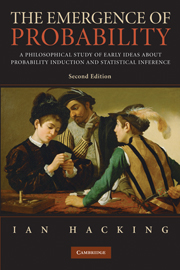 The Emergence of Probability
The Emergence of Probability Book contents
- Frontmatter
- Contents
- Introduction 2006
- 1 An absent family of ideas
- 2 Duality
- 3 Opinion
- 4 Evidence
- 5 Signs
- 6 The first calculations
- 7 The Roannez circle (1654)
- 8 The great decision (1658?)
- 9 The art of thinking (1662)
- 10 Probability and the law (1665)
- 11 Expectation (1657)
- 12 Political arithmetic (1662)
- 13 Annuities (1671)
- 14 Equipossibility (1678)
- 15 Inductive logic
- 16 The art of conjecturing (1692[?] published 1713)
- 17 The first limit theorem
- 18 Design
- 19 Induction (1737)
- Bibliography
- Index
7 - The Roannez circle (1654)
Published online by Cambridge University Press: 05 April 2013
- Frontmatter
- Contents
- Introduction 2006
- 1 An absent family of ideas
- 2 Duality
- 3 Opinion
- 4 Evidence
- 5 Signs
- 6 The first calculations
- 7 The Roannez circle (1654)
- 8 The great decision (1658?)
- 9 The art of thinking (1662)
- 10 Probability and the law (1665)
- 11 Expectation (1657)
- 12 Political arithmetic (1662)
- 13 Annuities (1671)
- 14 Equipossibility (1678)
- 15 Inductive logic
- 16 The art of conjecturing (1692[?] published 1713)
- 17 The first limit theorem
- 18 Design
- 19 Induction (1737)
- Bibliography
- Index
Summary
Poisson's famous sentence puts the matter succinctly if inaccurately: A problem about games of chance proposed to an austere Jansenist by a man of the world was the origin of the calculus of probabilities [1837, p. 1]. Leibniz reports it at greater length: ‘Chevalier de Méré, whose Agréments and other works have been published – a man of penetrating mind who was both a gambler and philosopher – gave the mathematicians a timely opening by putting some questions about betting in order to find out how much a stake in a game would be worth, if the game were interrupted at a given stage in the proceedings. He got his friend Pascal to look into these things. The problem became well known and led Huygens to write his monograph De Aleae. Other learned men took up the subject. Some axioms became fixed. Pensioner de Witt used them in a little book on annuities printed in Dutch' [P.S. v, p. 447].
This story is so familiar that it is, perhaps, the only incident in the early history of probability that may be called common knowledge. Since the circumstances have aroused such general interest, I shall depart from my usual practice and say a little more about what actually happened. When we pass from a study of the texts to more anecdotal concerns, we shall in general find that Leibniz, whom I have just quoted, is an admirable witness. He made no serious formal contribution to probability theory, but he had a lasting and profound interest in the subject. Indeed he was the first philosopher of probability.
- Type
- Chapter
- Information
- The Emergence of ProbabilityA Philosophical Study of Early Ideas about Probability, Induction and Statistical Inference, pp. 57 - 62Publisher: Cambridge University PressPrint publication year: 2006


